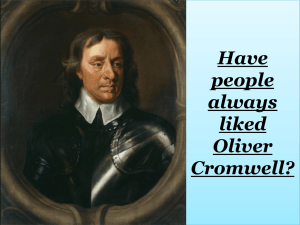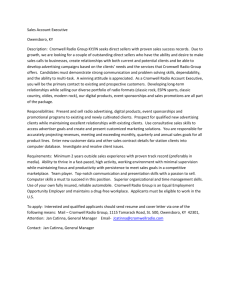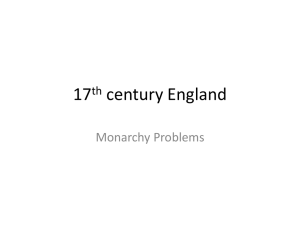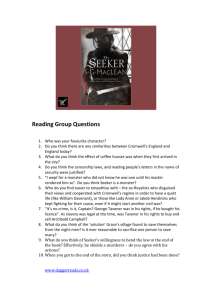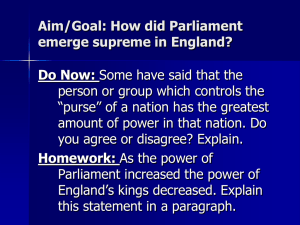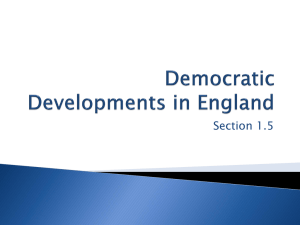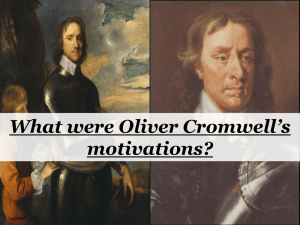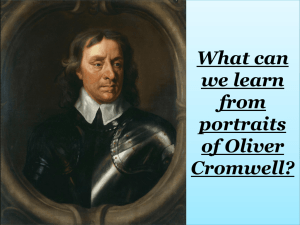Oliver Cromwell and the Puritan Revolution
advertisement
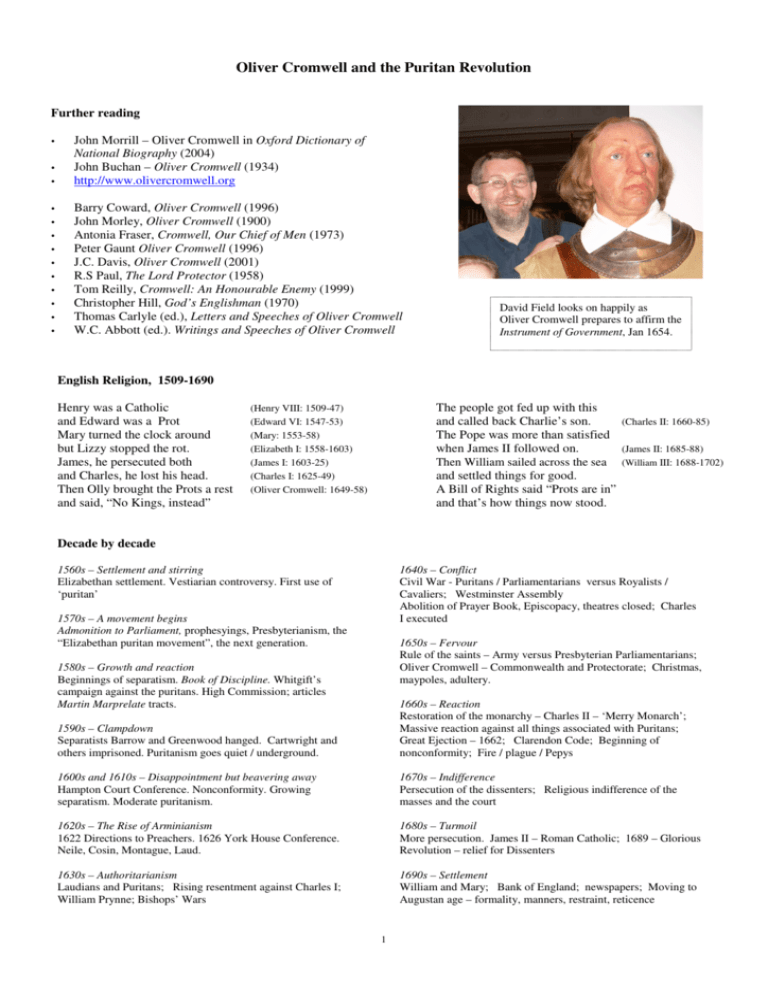
Oliver Cromwell and the Puritan Revolution Further reading • • John Morrill – Oliver Cromwell in Oxford Dictionary of National Biography (2004) John Buchan – Oliver Cromwell (1934) http://www.olivercromwell.org • • • • • • • • • • Barry Coward, Oliver Cromwell (1996) John Morley, Oliver Cromwell (1900) Antonia Fraser, Cromwell, Our Chief of Men (1973) Peter Gaunt Oliver Cromwell (1996) J.C. Davis, Oliver Cromwell (2001) R.S Paul, The Lord Protector (1958) Tom Reilly, Cromwell: An Honourable Enemy (1999) Christopher Hill, God’s Englishman (1970) Thomas Carlyle (ed.), Letters and Speeches of Oliver Cromwell W.C. Abbott (ed.). Writings and Speeches of Oliver Cromwell • David Field looks on happily as Oliver Cromwell prepares to affirm the Instrument of Government, Jan 1654. English Religion, 1509-1690 Henry was a Catholic and Edward was a Prot Mary turned the clock around but Lizzy stopped the rot. James, he persecuted both and Charles, he lost his head. Then Olly brought the Prots a rest and said, “No Kings, instead” The people got fed up with this and called back Charlie’s son. (Charles II: 1660-85) The Pope was more than satisfied when James II followed on. (James II: 1685-88) Then William sailed across the sea (William III: 1688-1702) and settled things for good. A Bill of Rights said “Prots are in” and that’s how things now stood. (Henry VIII: 1509-47) (Edward VI: 1547-53) (Mary: 1553-58) (Elizabeth I: 1558-1603) (James I: 1603-25) (Charles I: 1625-49) (Oliver Cromwell: 1649-58) Decade by decade 1560s – Settlement and stirring Elizabethan settlement. Vestiarian controversy. First use of ‘puritan’ 1640s – Conflict Civil War - Puritans / Parliamentarians versus Royalists / Cavaliers; Westminster Assembly Abolition of Prayer Book, Episcopacy, theatres closed; Charles I executed 1570s – A movement begins Admonition to Parliament, prophesyings, Presbyterianism, the “Elizabethan puritan movement”, the next generation. 1650s – Fervour Rule of the saints – Army versus Presbyterian Parliamentarians; Oliver Cromwell – Commonwealth and Protectorate; Christmas, maypoles, adultery. 1580s – Growth and reaction Beginnings of separatism. Book of Discipline. Whitgift’s campaign against the puritans. High Commission; articles Martin Marprelate tracts. 1590s – Clampdown Separatists Barrow and Greenwood hanged. Cartwright and others imprisoned. Puritanism goes quiet / underground. 1660s – Reaction Restoration of the monarchy – Charles II – ‘Merry Monarch’; Massive reaction against all things associated with Puritans; Great Ejection – 1662; Clarendon Code; Beginning of nonconformity; Fire / plague / Pepys 1600s and 1610s – Disappointment but beavering away Hampton Court Conference. Nonconformity. Growing separatism. Moderate puritanism. 1670s – Indifference Persecution of the dissenters; Religious indifference of the masses and the court 1620s – The Rise of Arminianism 1622 Directions to Preachers. 1626 York House Conference. Neile, Cosin, Montague, Laud. 1680s – Turmoil More persecution. James II – Roman Catholic; 1689 – Glorious Revolution – relief for Dissenters 1630s – Authoritarianism Laudians and Puritans; Rising resentment against Charles I; William Prynne; Bishops’ Wars 1690s – Settlement William and Mary; Bank of England; newspapers; Moving to Augustan age – formality, manners, restraint, reticence 1 Oliver Cromwell time-line (olivercromwell.org) 1599 1616 1628 1640 1642 1643 1644 1644 1644 1645 1645 1647 1648 1648 1649 Born Huntingdon - 25th April Enters Sidney Sussex College, Cambridge MP for Huntingdon MP for Cambridge Raises troops for Parliament Colonel in the Eastern Association Lieutenant-General of the Eastern Association Army Battle of Marston Moor - 2nd July Battle of Newbury - 27th October Lieutenant-General of the New Model Army Battle of Naseby - 14th June Supports Parliamentary army in clashes with Parliament Crushes royalist rising in South Wales Battle of Preston - 18th August Supports trial and execution of the King – January 1649 1650 1650 1651 1653 1653 1654 1655 1656 1657 1658 1661 Commands army sent to crush Ireland - August Commands army sent to crush Scotland - July Battle of Dunbar - 3rd September Battle of Worcester - 3rd September Dissolves Parliament - 20th April Becomes Lord Protector - 16th December Meets first Protectorate Parliament - September System of the Major- Generals established October Meets second Protectorate Parliament September Rejects Parliament's offer of the crown and remains Lord Protector, March - June Dies at Whitehall - 3rd September Exhumed and posthumously 'executed' - 30th January The Charges against Oliver Cromwell Specific actions • • • Iconcoclasm Regicide The massacres in Ireland Political/governmental failures • • • Moralistic authoritarianism Too much influence to the Army Military rule The man • • • Impulsive piety Providentialism Proud hypocrite Cromwell the Enigma John Morrill on Cromwell: He could never make the adjustment from war where the objective was always clear and the victory unambiguous. The pragmatism and compromise of the political arena constantly dismayed him and ground him down. All this cost him in personal terms. He yearned to ‘keep a flock of sheep under a woodside’, to emulate Gideon who led the armies of Israel and then returned to his farm. But God would not let him go. God would have him serve. And still there was before him the mirage of a perfected humanity. He had seen that corrupted institutions could not deliver a humanity more obedient to the will of God. He was called to overthrow tyranny and pride and replace it with humility and a common concern to share the fragments of truth that so many men of goodwill had been granted. But instead pride and self-interest kept on taking over. As he climbed another barren hill and peered over the next sun-baked valley, the mirage reappeared. What makes Oliver Cromwell endlessly appealing and endlessly alarming is that he was true to his own vision. He never doubted his call to service or to salvation. He knew enough of the Bible to know that all those whom God called, he chastened. The fierceness of his determination to free all those whose sense of God shared elements of his own experience drove him into uncomfortable action. He was not wedded and glued to forms of government. He was not bound by human law. If God called upon him to be the human instrument of his wrath, he would not flinch. His sense of himself as the unworthy and suffering servant of a stern Lord protected him from the tragic megalomanias of others who rose to absolute power on the backs of revolutions. Cromwell’s achievements as a soldier are great but unfashionable; as a religious libertarian great but easily mis-stated; as a statesman inevitably stunted. No man who rises from a working farmer to head of state in twenty years is other than great. To achieve that and still to be able to say that ‘if here I may serve my God either by my doing or by my suffering, I shall be most glad’ is a man of towering integrity. He was to himself and to his God most true, if at great cost to himself and others. John Buchan on Cromwell: A devotee of law, he was forced to be often lawless; a civilian to the core, he had to maintain himself by the sword; with a passion to construct, his task was chiefly to destroy; the most scrupulous of men, he had to ride roughshod over his own scruples and those of others; the tenderest, he had continually to harden his heart; the most English of our greater figures, he spent his life in opposition to the majority of Englishmen; a realist, he was condemned to build that which could not last. 2 Quotes of Oliver Cromwell - 1599-1658 from http://olivercromwell.org If the remonstrance had been rejected I would have sold all I had the next morning and never have seen England more, and I know there are many other modest men of the same resolution. (On Parliament’s passing of the revolutionary Grand Remonstrance). I had rather have a plain russet-coated captain that knows what he fights for, and loves what he knows, than that which you call a gentleman and is nothing else. (Letter from Cromwell to Sir William Spring. Sept. 1643.) Truly England and the church of God hath had a great favour from the Lord, in this great victory given us. (On the battle of Marston Moor. 1644.) We study the glory of god, and the honour and liberty of parliament, for which we unaminously fight, without seeking our own interests....I profess I could never satisfy myself on the justness of this war, but from the authority of the parliament to maintain itself in its rights; and in this cause I hope to prove myself an honest man and single-hearted. (To Colonel Valentine Walton. 5 or 6 September 1644.) I could not riding out alone about my business, but smile out to God in praises, in assurance of victory because God would, by things that are not, bring to naught things that are. (Before the battle of Naseby. 1645.) I tell you we will cut off his head with the crown upon it . (To one of the judges at the trial of King Charles I.1648.) “cruel necessity” (On the execution of King Charles I. Jan 1649.) This is a righteous judgement of God upon these barbarous wretches, who have imbrued their hands in so much innocent blood.... (After the storming of Drogheda.1649.) I need pity. I know what I feel. Great place and business in the world is not worth looking after. (On himself, letter to Richard Mayor, July 1650.) I beseech you in the bowels of christ think it possible you may be mistaken. (In a letter to the general assembly of the Church of Scotland. 1650.) No one rises so high as he who knows not whither he is going. (On personal fortunes.) Take away that fool’s bauble, the mace. (Oliver Cromwell speech dismissing the Rump Parliament. Apr. 1653.) When I went there, I did not think to have done this. But perceiving the spirit of God so strong upon me, I would not consult flesh and blood. (On himself, on his forcible dissolution of Parliament in April 1653, in James Heath, Flagellum.) You have been sat to long here for any good you have been doing. Depart, I say, and let us have done with you. In the name of god, go!. (Addressing the Rump Parliament. April 1653.) The people would be just as noisy if they were going to see me hanged. (Cromwell referring to a cheering crowd.1654) Weeds and nettles, briars and thorns, have thriven under your shadow, dissettlement and division, discontentment and dissatisfaction, together with real dangers to the whole. (Cromwell’s speech dissolving the 1st Protectoral Parliament.) God has brought us where we are, to consider the work we may do in the world, as well as at home. (Cromwell to the Army Council. 1654.) I desire not to keep my place in this government an hour longer than I may preserve england in it’s just rights, and may protect the people of God in such a just liberty of their consciences.... (To the first Protectorate Parliament, 22 January 1655) You drew me here to accept the place I now stand in. There is ne’er a man within these walls that can say, sir, you sought it, nay, not a man nor woman treading upon English ground. (Speech to Parliament, 4 February 1658.) Mr Lely, I desire you would use all your skill to paint your picture truly like me, and not flatter me at all; but remark all these roughness, pimples, warts, and everything as you see me; otherwise I will never pay a farthing for it. (On having his portrait painted, in Horace Walpole, Anecdotes of Painting.) 3 Quotes about Oliver Cromwell - 1599-1658 from http://olivercromwell.org .... he thought secrecy a virtue, and dissimulation no vice, and simmulation, that is in plain English, a lie, or perfiderousness to be tolerable fault in case of necessity. (Richard Baxter) He was of a sanguine complexion, naturally of such a vivacity, hilarity and alacrity as another man is when he hath drunken a cup too much. (Richard Baxter) In a word, as he was guilty of many crimes against which Damnation is denounced, and for which hell-fire is prepared, so he had some good qualities which have caused the memory of some men in all Ages to be celebrated; and he will be look’d upon by posterity as a brave badd man. (Edward Hyde, Earl of Clarendon, History of the Rebellion.) He lived a hypocrite and died a traitor. (John Foster) That slovenly fellow which you see before us, who hath no ornament in his speech; I say that sloven, if we should ever come to have a breech with the King (which God forbid) in such case will be one of the greatest men of England. (John Hampden, Speaking to Lord Digby in the house of commons, overheard by Sir Richard Bulstrode.) A complex character such as that of Cromwell, is incapable of creation, except in times of great civil and religious excitement, and one cannot judge of the man without at the same time considering the contending elements by which he was surrounded. It is possible to take his character to pieces, and, selecting one or other of his qualities as a corner-stone, to build around it a moument which will show him as a patriot or a plotter, a Christian man or a hypocrite, a demon or a demiGod as the sculptor may choose. (F.A Inderwick, The Interregnum, 1648-60) Of late I have not given so free and full a power unto (Cromwell) as formerly I did, because I heard that he used his power so as in honour I could not avow him in it. ... for his expressions were sometimes against the nobility, that he hoped to live to see never a nobleman in England, and he loved such (and such) better than others because they did not love Lords. And he further expressed himself with contempt of the Assemberly of Divines ... these he termed persecutors, and that they persecuted honester men than themselves. (Earl of Manchester, Letter to the House of Lords, December 1644.) Cromwell, our chief of men, who through a cloud, Not of war only, but detractions rude, Guided by faith and matchless fortitude, To peace and truth thy glorious way has ploughed And on the neck of crowned fortune proud Has reared God’s trophies, and his work pursued, While Darwen stream with blood of Scots imbrued, And Dunbar field resounds thy praises loud, And Worcester’s laureate wreath. Yet much remains To conquer still; peace hath her victories No less renowned than war: new foes arise, Threatening to bind our souls with secular chains: Help us to save free conscience from the paw Of hireling wolves whose gospel is their maw. John Milton, Sonnet XV1, To the Lord General Cromwell. He was a practical mystic, the most formidable and terrible of all combinations, uniting an aspiration derived from the celestial and supernatural with the energy of a mighty man of action; a great captain, but off the field seeming, like a thunderbolt, the agent of greater forces than himself ; no hypocrite, but a defender of the faith; the raiser and maintainer of the Empire of England. (Lord Rosebery) ...the English monster, the center of mischief, a shame to the British Chronicle, a pattern for tyranny, murder and hypocrisie, whose bloody Caligula, Domitian, having at last attained the height of his ambition, for five years space, he wallowed in the blood of many gallant and heroick persons. (Gerard Winstanley, Loyal Martyrology) To give the devil (Cromwell) his due, he restored justice, as well distributive as comutative, almost to its ancient dignity and splendour; the judges without covetousness discharging their duties according to law and equity.....His own court also was regulated according to a severe discipline; here no drunkard, nor whoremonger, nor any guilty of bribery, was to be found, without severe punishment. Trade began again to prosper; and in a word, gentle peace to flourish all over England. Physician to the Cromwellian Court, George Bate. 4 From the Instrument of Government, 1654: XVII. That the persons who shall be elected to serve in Parliament, shall be such (and no other than such) as are persons of known integrity, fearing God, and of good conversation, and being of the age of twenty-one years. XXXIII. That Oliver Cromwell, Captain-General of the forces of England, Scotland and Ireland, shall be, and is hereby declared to be, Lord Protector of the Commonwealth of England, Scotland and Ireland, and the dominions thereto belonging, for his life. XXXV. That the Christian religion, as contained in the Scriptures, be held forth and recommended as the public profession of these nations; and that, as soon as may be, a provision, less subject to scruple and contention, and more certain than the present, be made for the encouragement and maintenance of able and painful teachers, for the instructing the people, and for discovery and confutation of error, hereby, and whatever is contrary to sound doctrine; and until such provision be made, the present maintenance shall not be taken away or impeached. XXXVI. That to the public profession held forth none shall be compelled by penalties or otherwise; but that endeavours be used to win them by sound doctrine and the example of a good conversation. XXXVII. That such as profess faith in God by Jesus Christ (though differing in judgment from the doctrine, worship or discipline publicly held forth) shall not be restrained from, but shall be protected in, the profession of the faith and exercise of their religion; so as they abuse not this liberty to the civil injury of others and to the actual disturbance of the public peace on their parts: provided this liberty be not extended to Popery or Prelacy, nor to such as, under the profession of Christ, hold forth and practise licentiousness. 5
